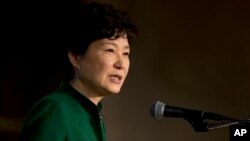South Korea responded cautiously Monday to Kim Jong Un’s recent call to improve bilateral relations.
During his New Year’s Day message, the North Korean leader said Pyongyang “will make strenuous efforts to develop inter-Korean talks and improve bilateral relations.”
No talks looming
In response, Seoul’s Unification Ministry spokesman Jeong Joon-hee on Monday said there are no immediate plans to propose any new talks with Pyongyang.
Instead, Jeong chose to respond to the sharp criticism Kim directed at South Korea in his address when the North Korean leader called President Park Geun-hye’s peaceful reunification goal a disguised form of “regime change” in the North.
“We urge North Korea to face our effort to establish a basis for peaceful reunification, and put effort to create an era of peaceful reunification on the Korean peninsula through trust between two Koreas,” said Jeong Joon-hee.
Following the inter-Korean talks that collapsed in December, Seoul seems to be taking a harder stance against Pyongyang.
The two days of high-level talks in December failed to make progress on modest, non-political projects like instituting regular reunions for families that were separated by the division of the Korean peninsula and restarting cross-border tourism.
Afterwards, South Korean Foreign Minister Yun Byung-se noted that the lack of trust between the North and South makes any substantial dialogue difficult. Yun downplayed the possibility of a summit between Park and Kim until North Korea curbs its nuclear weapons program.
In addition, North Korea analyst Kim Yong-hyun with Dongguk University in Seoul said, with South Korean legislative elections scheduled for April, the Park administration is unlikely to risk alienating its conservative supporters by engaging in politically risky negotiations with the North.
“At this point, it is difficult to create a mood to hold talks between the two Koreas,” said Kim Yong-hyun.
North Korea nuclear
While Kim Jong Un did not mention his country’s nuclear program during his New Year address, there are indications that North Korea may be preparing to test its thermonuclear weapons capabilities.
South Korea’s Chemical, Biological and Radiological (CBR) Defense Command reported Sunday that Pyongyang may be building a light water nuclear reactor to produce tritium, a radioactive isotope necessary to build more sophisticated nuclear weapons.
The U.S. research institute 38 North, which studies high-resolution commercial satellite imagery of the region, said last week North Korea is excavating a new tunnel. The site of the new tunnel is at Punggye-ri where Pyongyang conducted its three nuclear tests in 2006, 2009 and 2013.
These activities support Seoul's National Intelligence Service assertion in October that Pyongyang is preparing for its fourth nuclear test.
China’s influence debated
North Korea last year made threats to launch a long-range rocket and conduct a fourth nuclear test. Officials in Seoul have credited China with persuading the North to restrain from initiating provocative weapons tests in exchange for expanded economic development at the China-North Korea border.
However, North Korea analyst Bruce Bechtol at Angelo State University in Texas is doubtful that China wields that degree of influence over North Korea. While ties have improved of late, Sino-North Korean relations have been contentious since Beijing supported U.N. sanctions against Pyongyang for conducting its third nuclear test in 2013.
Bechtol said North Korea’s recent nuclear restraint may have been caused more by technical delays than relenting to political and economic pressure.
“It may be nothing more than that. It may have nothing to do with the Chinese. In fact that is probably likely,” he said.
Last month Kim Jong Un also claimed his country now possesses a hydrogen bomb, which is more powerful than the atomic bombs tested in the past. The U.S. discounted Kim’s hydrogen bomb claim as unsubstantiated, but cautioned that North Korea's nuclear ambitions pose a very serious risk to global peace and security.
Youmi Kim in Seoul contributed to this report.





